How the Housing Crisis Is Impacting the Goals and Well-Being of Younger Canadians
As part of a month-long detailed investigation of the housing crisis in Canada, Abacus Data and the Canadian Real Estate Association (CREA) conducted a large, national survey of 3,500 Canadian adults (18+) from September 22 to 28, 2023. In our first report, we examine how the housing crisis has impacted Canada’s youngest cohort – those aged 18 to 34 (n=863). The data reveals a story of profound challenges faced by these young Canadians that extends far beyond financial struggles, delving into the heart of their lives and aspirations.
Concerns with the Housing Market
The concern about the state of housing in Canada is evident among young Canadians. When contemplating the key issues that should top the federal government’s agenda, a resounding 89% of young Canadians emphasize that ensuring housing affordability should be a top priority. Correspondingly, a significant four out of five express their unease about housing affordability, while 62% have seen their concerns intensify in recent months. Considering these pressing concerns, it becomes imperative to delve deeper into the burden this situation places on young Canadians.
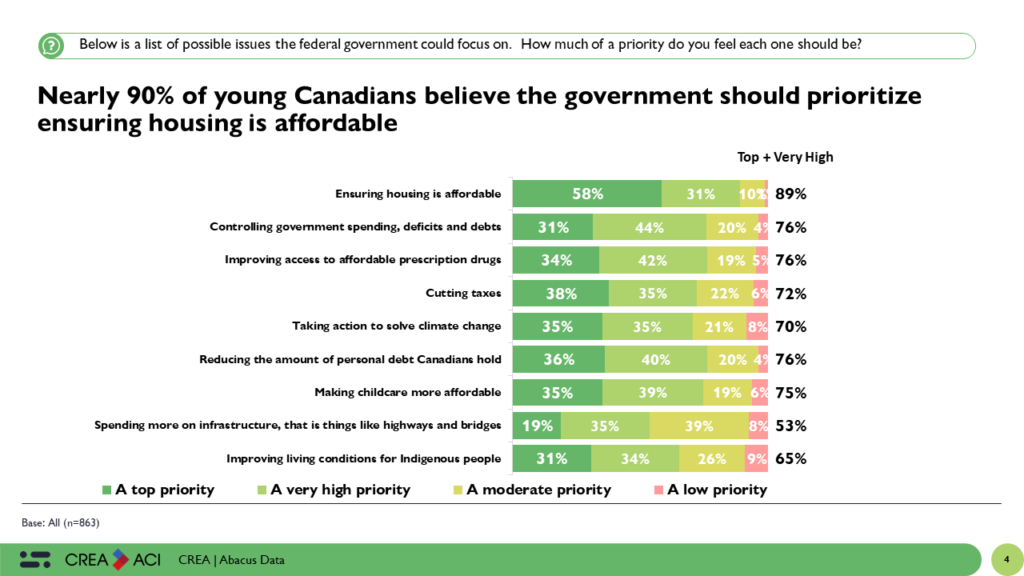
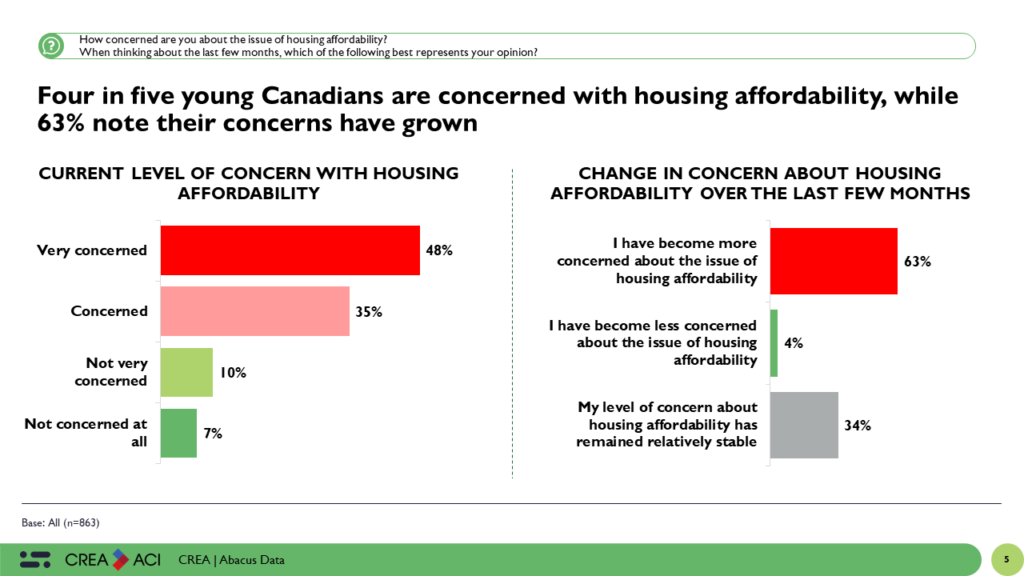
Financial Struggles: A Quiet Burden
The current housing crisis has had a significant impact on young Canadians, presenting them with significant financial challenges. Notably, an alarming 47% of young Canadians find themselves burdened with moderate to high levels of debt, a striking contrast to their older counterparts. Additionally, the data paints a sobering picture, revealing that nearly two-thirds (60%) of young Canadians are currently grappling with the precarious reality of living paycheck to paycheck, signifying an unsettling financial instability.
Amidst these financial pressures, the need to adjust monthly budgets due to housing expenses has become an unfortunate reality for 53% of young Canadians. They reported having to make financial adjustments to food and groceries (68%), emergency savings (57%), investments (49%), and debt payments (51%).
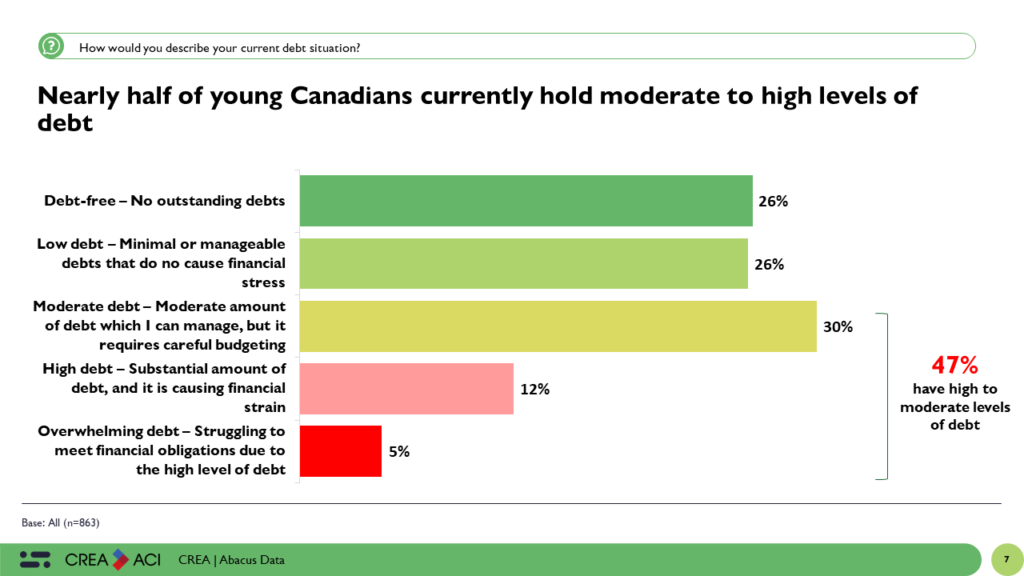
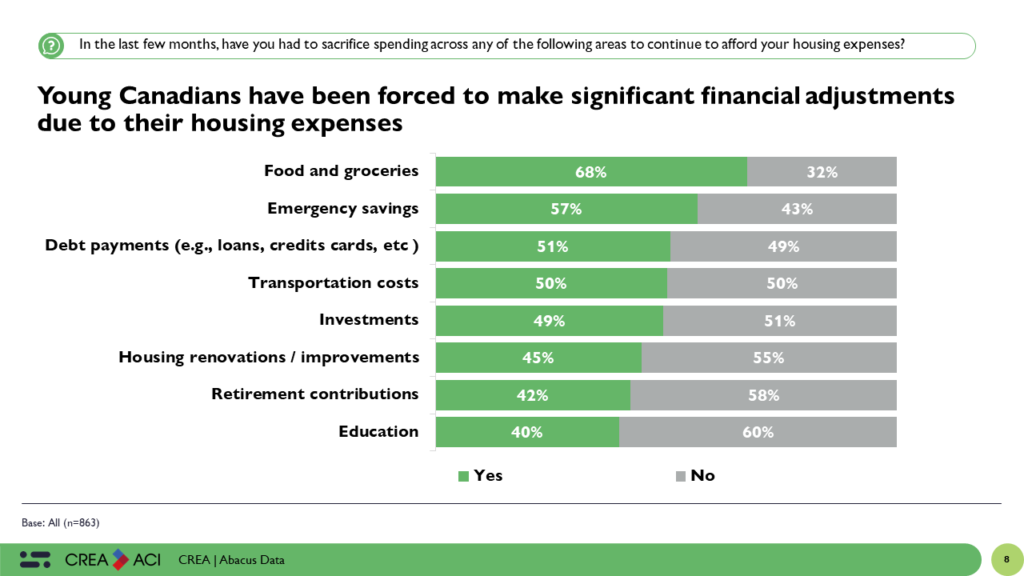
Worries About Housing Payments and Future Stability
Housing payments continue to be a source of concern for young Canadians. An overwhelming 89% of young Canadians have worried about paying their mortgage or rent in recent months (among those who have a mortgage/pay rent). This enduring financial unease underscores the persistent nature of the housing crisis.
Adding to their worries is the lingering uncertainty that casts a long shadow over their future. An overwhelming four in five (81%) express deep-seated concerns regarding the enduring repercussions of the housing market on their financial stability, a sentiment that resonates far more profoundly among young Canadians than their older counterparts.
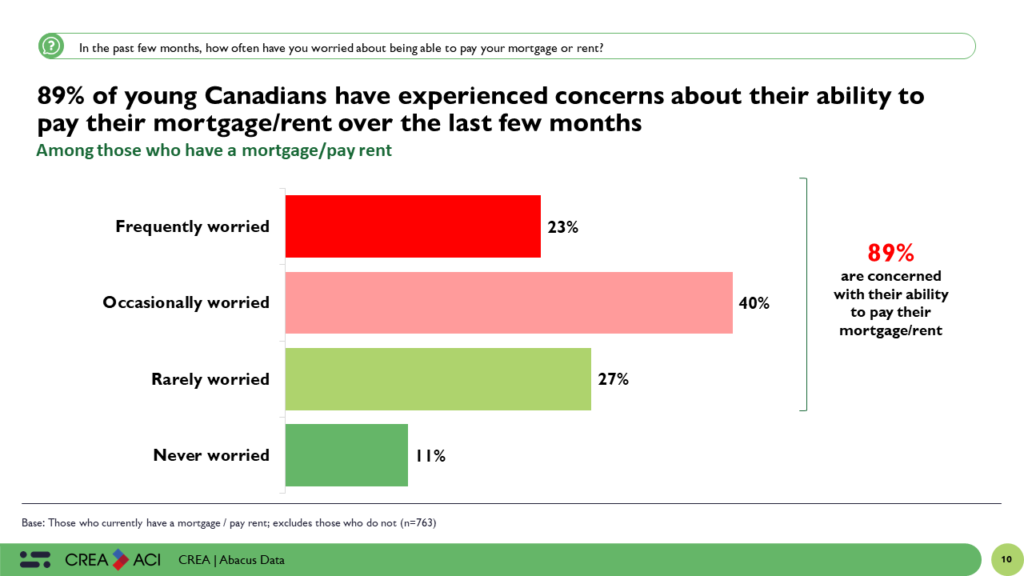
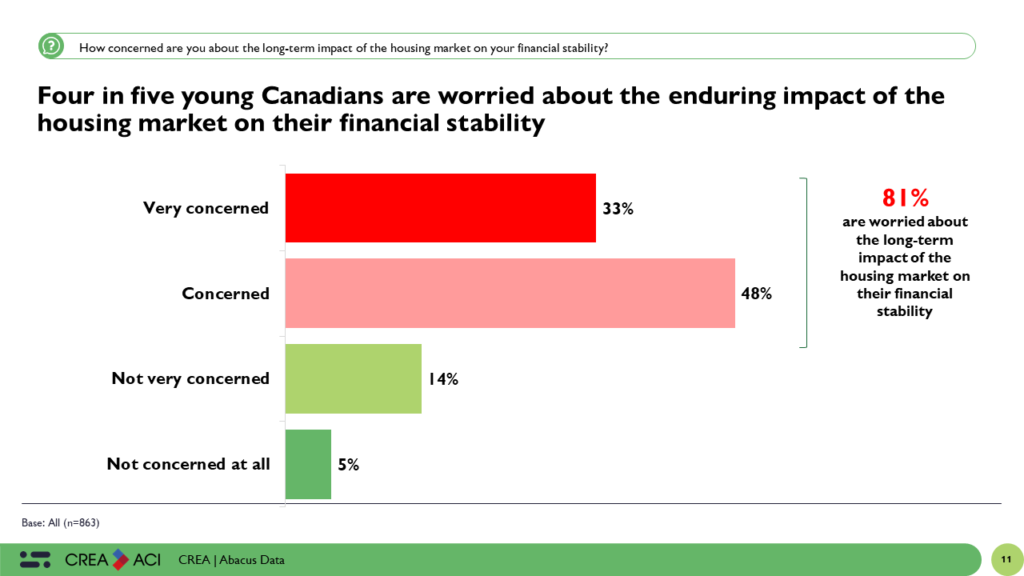
Personal Impact: A Complex Reality
For these young Canadians, the housing crisis isn’t merely a financial struggle – it’s impacting their mental health and overall well-being.
Nearly two-thirds of young Canadians (61%) revealed that their financial situation, shaped by the housing crisis, negatively affects their mental health. Further, the survey also finds that the housing crisis has impacted nearly every facet of young Canadians’ lives, including their overall quality of life (73%), finances (76%), physical health (59%), family dynamics (56%), and social lives (58%) more than any other age group.
The housing crisis isn’t only influencing day-to-day life; it’s shaping major life decisions. A significant 55% of young Canadians who intend to have children admit that it has influenced the decision and timing of starting a family. Some are choosing to have fewer or no children (27%), while others are temporarily postponing family planning (28%).
The looming housing crisis is also driving young people to reconsider where they live and work. Most striking, younger Canadians are most likely to report that they are considering moving to find more affordable housing. Specifically, 46% are contemplating a move within their province, 41% are considering changing provinces, and 34% are even pondering leaving Canada all together. The risk of a brain-drain from unaffordable communities, provinces, and Canada entirely is real and acute.
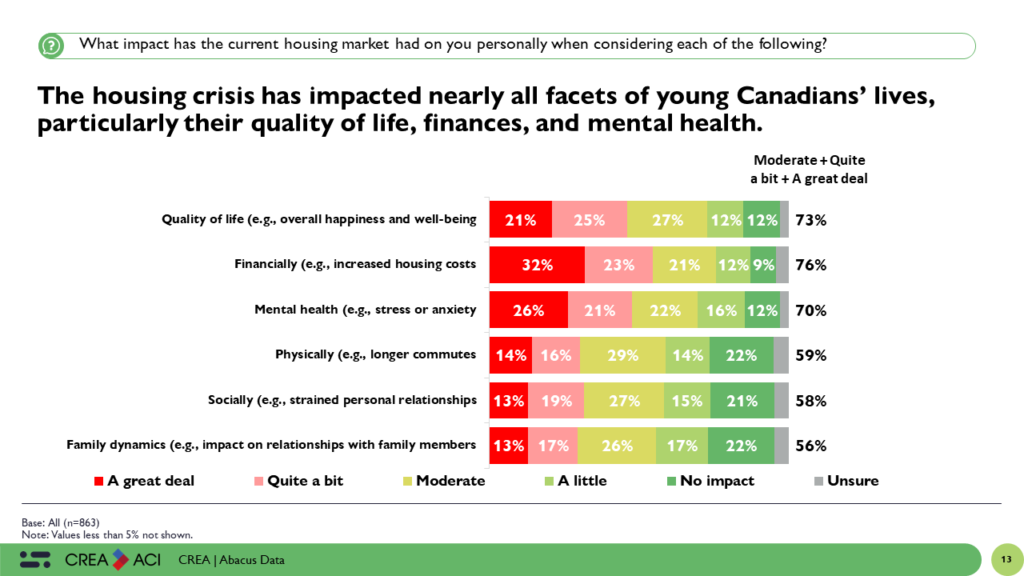
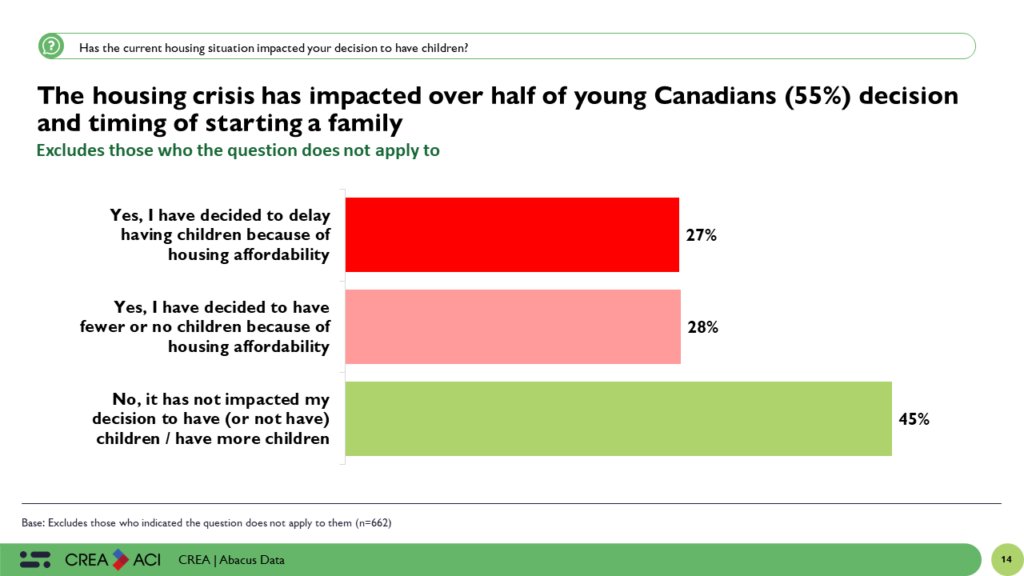
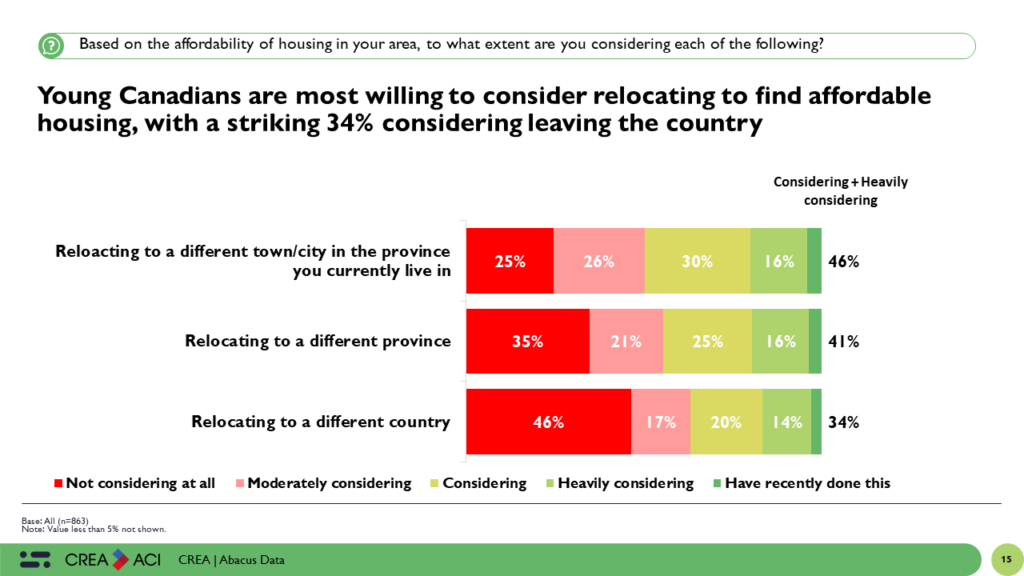
A Resounding Message – Governments Haven’t Done Enough
The message from young Canadians is unequivocal: governments have not done enough to address the housing crisis. This sentiment cuts across all levels of government—federal, provincial, and municipal —painting a stark picture of disillusionment with the efforts made thus far. An overwhelming 63% express dissatisfaction with the federal government’s response, while 62% believe that provincial governments have fallen short. Meanwhile, 58% feel that municipal governments have not done enough to tackle the crisis head-on. This collective critique underscores the urgent need for more robust, comprehensive measures at all levels.
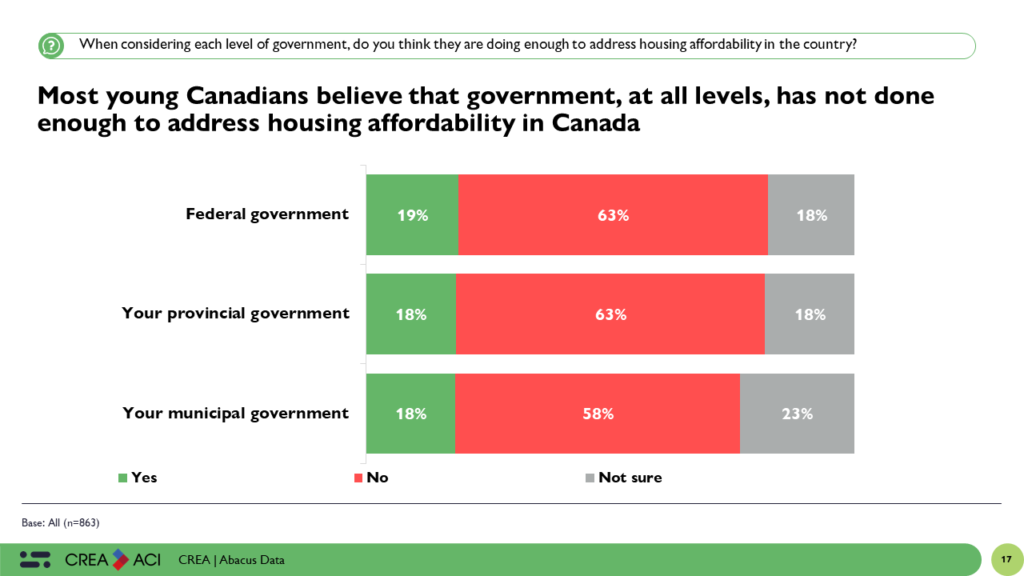
A Unified Call for Priority and Action
Young Canadians have spoken with one voice when it comes to the priority placed on housing affordability. A resounding 77% assert that it should be a top priority for the federal government, while 76% hold the same view for provincial governments. At the municipal level, 70% emphasize the importance of prioritizing housing affordability. However, a disconcerting perception gap emerges when evaluating the government’s current actions. Only 51% believe that the federal government is treating housing affordability as a top priority today, while 50% believe their provincial government sees it as a top priority, and a slightly lower 47% share the same sentiment about their municipal governments. This disconnect underscores a sense of frustration and skepticism about the government’s commitment to translating priorities into tangible actions.
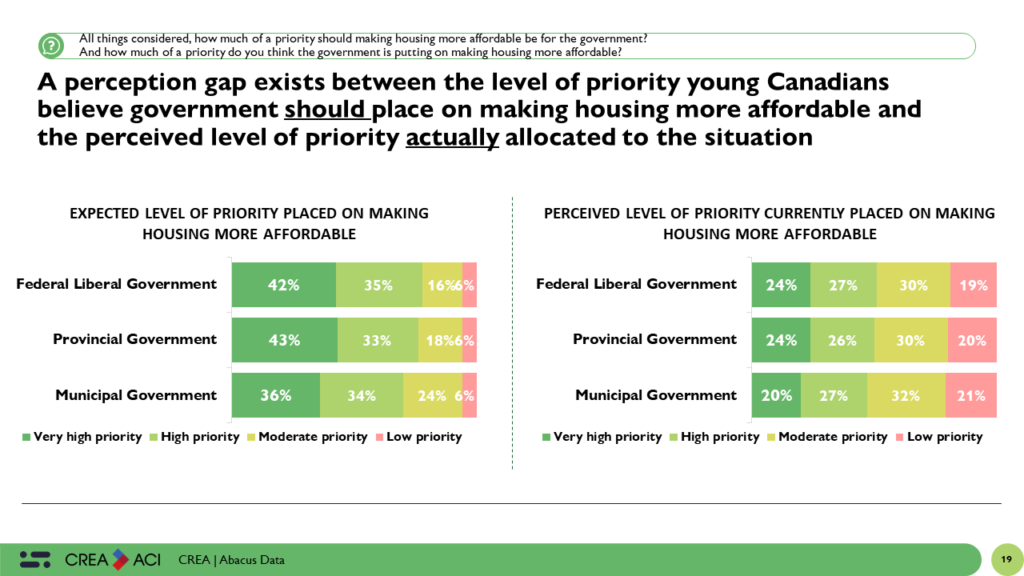
Dissatisfaction with Leadership – A Shared Sentiment
Across all levels of government, young Canadians express profound dissatisfaction with the leadership’s response to the housing crisis. An overwhelming 73% express dissatisfaction with the federal government, while 72% share the same sentiment regarding provincial governments. Municipal governments also face considerable discontent, with 69% of young Canadians dissatisfied with their leadership. This collective frustration underscores a growing impatience with the perceived ineffectiveness of government efforts.
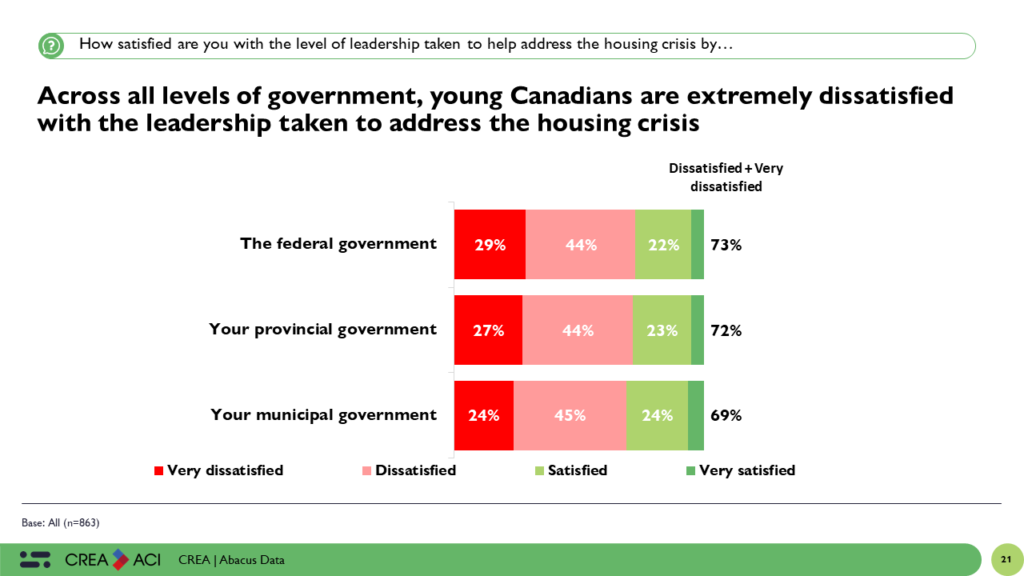
Blame Allocation – Federal, Provincial, and Municipal Roles
Young Canadians exhibit a nuanced understanding of shared responsibility in the housing crisis. While they firmly place blame on the federal government (49%) for its role in the crisis, they also hold provincial governments (40%) accountable. Only 11% believe that municipal governments are more to blame, suggesting a recognition that housing affordability is a challenge requiring broader, higher-level government intervention.
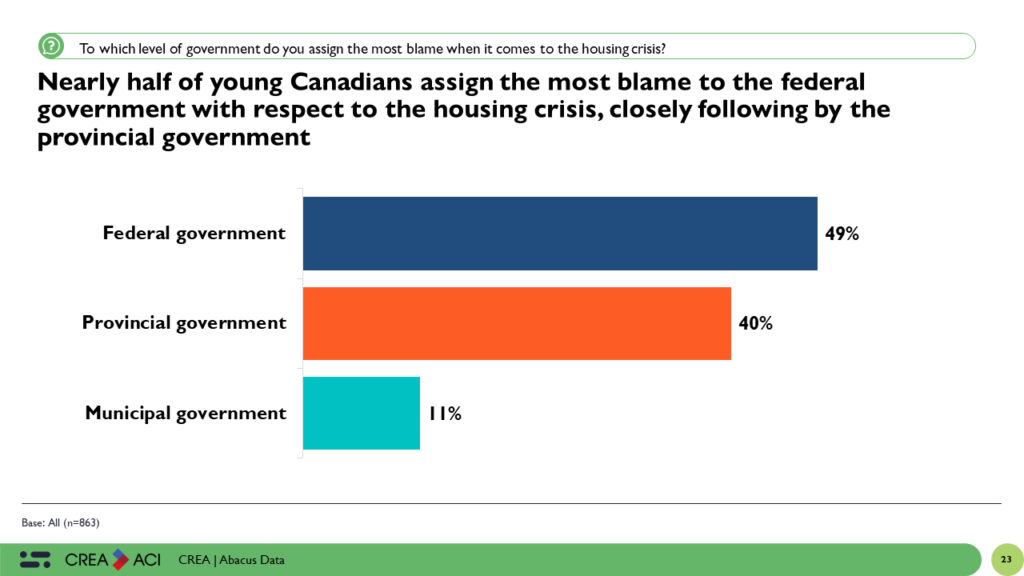
Seeking Solutions
Among the solutions that resonate most strongly with young Canadians is the expansion of the Home Buyers Plan for first-time homebuyers, with a significant 60% supporting increasing the plan’s limit from $35,000 to $50,000. This suggests that young Canadians are acutely aware of the need to make homeownership more accessible, especially for those taking their first steps into the real estate market.
Interestingly, young Canadians diverge from older generations on certain housing solutions. They are more inclined to support measures such as limiting tax-free gains on primary residences (47%) and changing the mortgage stress test to ensure buyers can afford an uninsured mortgage if interest rates rise (44%). These unique approaches reflect a willingness to explore unconventional avenues to tackle the housing crisis head-on.
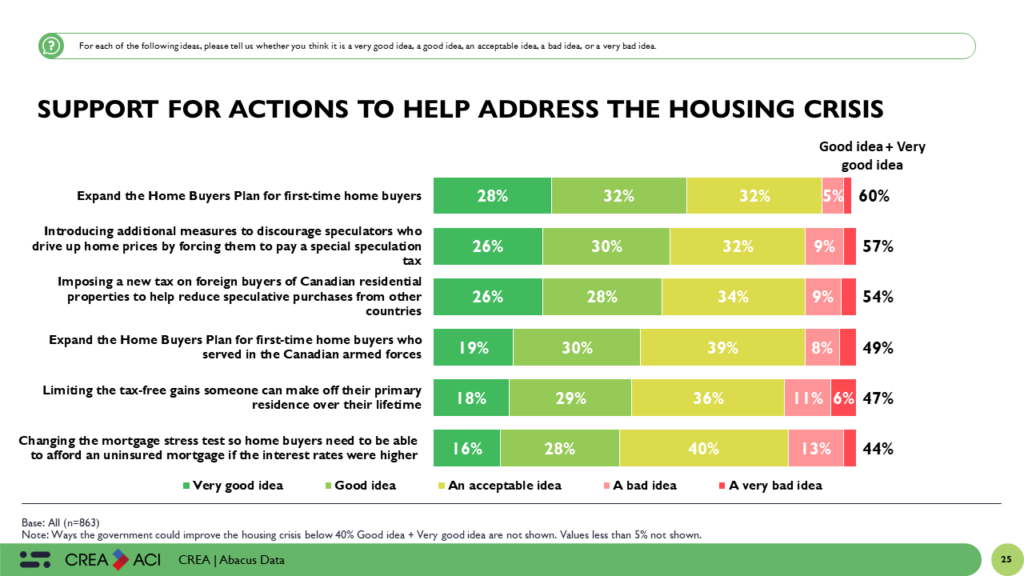
Incentives and Policies – A Comprehensive Approach
Young Canadians understand that solving the housing crisis requires a multifaceted approach. They align with older age groups in supporting a range of incentives and policies. A substantial 63% express support for a First Home Savings Account, while 58% endorse the Housing Accelerator Fund. The Underused Housing Tax, Home Buyers Plan, and fostering collaboration among all levels of government and housing stakeholders also garner strong support, all with the aim of finding holistic solutions to the housing crisis.
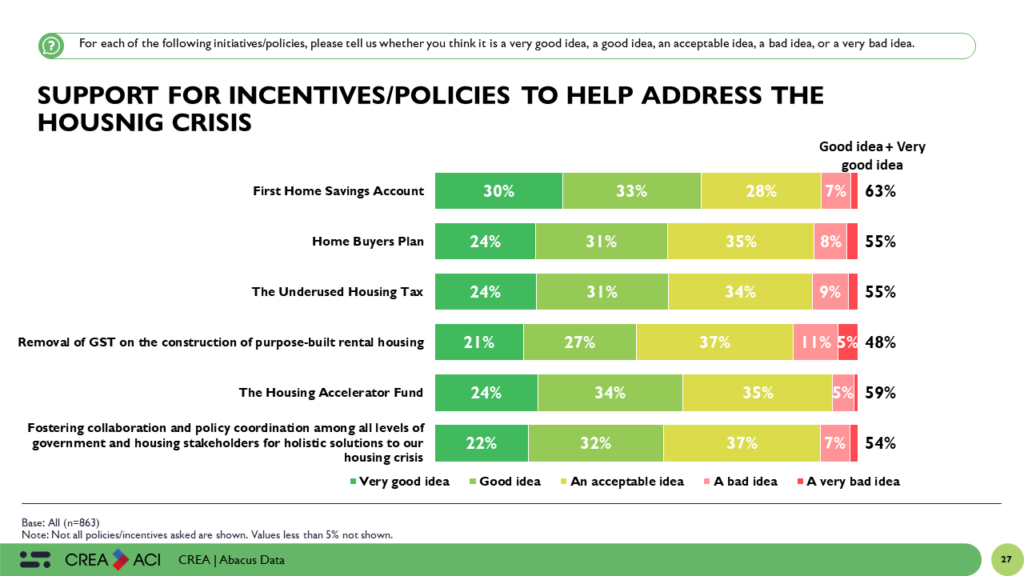
The Upshot
This research vividly highlights that the housing crisis in Canada transcends mere economic challenges. It has evolved into a deeply personal and emotional journey for young Canadians, profoundly shaping their lives, influencing critical decisions, and imposing significant financial strains. Beyond the statistics and figures, it’s a multifaceted challenge that is redefining their very existence, compelling them to navigate difficult choices, and frustratingly delaying crucial life milestones.
The data underscores that young Canadians are not merely asking but demanding swift and comprehensive actions to address the housing crisis. Their profound dissatisfaction with government responses, their unwavering insistence on housing affordability as a top priority, and their collective attribution of blame emphasize the urgent need to confront this pressing issue head-on. The housing crisis is not an abstract concept for them; it’s a stark reality that has significantly influenced their political perspectives, igniting a fervor for immediate public policy solutions.
As the concerns over Canada’s housing crisis continue to grow among young Canadians, their frustration and disillusionment may find expression in political action. This potential surge in political engagement could herald a transformation in voting patterns, with younger citizens increasingly throwing their support behind candidates who champion affordable housing policies. Such a shift could wield considerable influence over electoral outcomes.
Furthermore, the housing crisis could give rise to inter-generational tensions, as older generations, who secured housing more easily, may be perceived as benefiting from policies that disadvantage younger ones. These tensions could permeate political debates and policy discussions, creating a dynamic that demands careful consideration.
Lastly, the enduring impact of the housing crisis may extend beyond the present moment. It could shape the long-term political engagement and ideologies of young Canadians. If a substantial portion of this demographic continues to grapple with economic challenges stemming from housing costs, their political convictions and participation could be molded for years to come, influencing their preferences for specific policies and political parties.
Overall, Canada’s housing crisis among 18-34-year-olds is not just a policy challenge; it’s a political awakening. Its impact on politics will depend on various factors, including the severity of the crisis, the responsiveness of political leaders, and the effectiveness of measures taken to address it. As young Canadians demand change, the political realm must listen to their call, recognizing that their votes, aspirations, and perspectives possess the power to transform the course of Canadian politics.
Methodology
The survey was conducted with 3,500 Canadian adults from September 22 to 28, 2023. A random sample of panelists were invited to complete the survey from a set of partner panels based on the Lucid exchange platform. These partners are typically double opt-in survey panels, blended to manage out potential skews in the data from a single source.
The margin of error for a comparable probability-based random sample of the same size is +/- 1.66%, 19 times out of 20.
The margin of error for a comparable probability-based random sample of those aged 18 to 34 (n=863) is +/- 3.34%, 19 times out of 20.
The data were weighted according to census data to ensure that the sample matched Canada’s population according to age, gender, educational attainment, and region.
This survey was paid for by Abacus Data Inc.
Abacus Data follows the CRIC Public Opinion Research Standards and Disclosure Requirements that can be found here: https://canadianresearchinsightscouncil.ca/standards/
About Abacus Data
We are the only research and strategy firm that helps organizations respond to the disruptive risks and opportunities in a world where demographics and technology are changing more quickly than ever.
We are an innovative, fast-growing public opinion and marketing research consultancy. We use the latest technology, sound science, and deep experience to generate top-flight research-based advice to our clients. We offer global research capacity with a strong focus on customer service, attention to detail, and exceptional value.
We were one of the most accurate pollsters conducting research during the 2021 Canadian election following up on our outstanding record in 2019.
Contact us with any questions
Find out more about how we can help your organization by downloading our corporate profile and service offering.